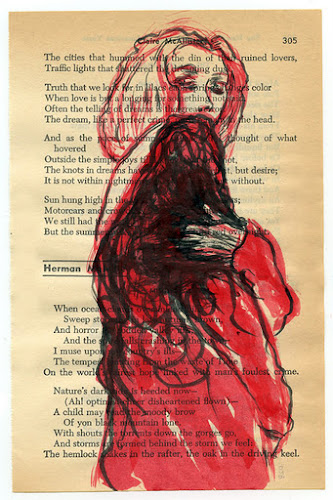ruined
 ruined; red acrylic ink on paper, 4.25 x 6.25 inches, page taken from an old English text book. In the shop.
ruined; red acrylic ink on paper, 4.25 x 6.25 inches, page taken from an old English text book. In the shop.JULY IN THE JARDIN DES PLANTES
The summer days moved with the pace of a caged lion.
To stroll through crowds by the parkgates at dusk was a game:
O could we snatch out of that dusk a moment
That memory might, as food or whip-lash, tame.
To take what shape of cloud or smile was given
Was to stroll no longer the lost one's eyes
Upon us except obliquely, like next Autumn,
Last Spring that peered at Summer now through bars.
Mist rising up from the morning-warmed grass was a spector
That muffled the noise of nurses and nursed by sand.
Sycamore branches stuck outside the nightmare.
I traced them like the lines in the palm of my hand
Thinking someday under a sycamore I shall watch summers
Remembering with pride, with shame, the streets of Youth,
The cities that hummed with the din of their ruined lovers,
Traffic lights that shattered the dreaming dusk.
Truth that we look for in lilacs each spring changes color
When love is but a longing for something not said.
Often the telling of dreams is the great error:
The dream, like a perfect crime, must remain in the head.
And, as the pace of summer quickened I thought of what
hovered
Outside the simple joys till I knew that the knot,
The knots in dreams haven't come from defeat, but desire;
It is not within nightmares we walk alone, but without.
Sun hung high in the yellow six o'clock darkness;
Motorcars and crowds sawm in that light.
We still had the rest of July and all of August,
But the summerdusk darkens; leaves turn red overnight.
~ Claire McAllister


Comments
Post a Comment